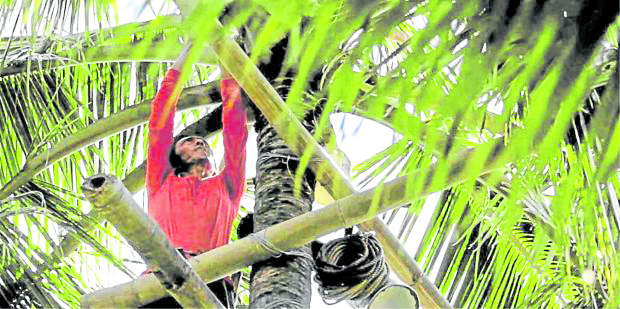As we commemorate the 50th anniversary of the Philippine Coconut Authority (PCA), it is crucial to outline three key initiatives that will uplift the coconut industry and support our farmers. Despite being the top coconut exporter worldwide, with 3.5 million farmers and farm workers contributing to the industry, we face threats from global competition and remain the poorest sector in our country. To address this critical situation, we must utilize the recently available P130 billion coconut levy fund. Additionally, we must respond to our president’s call for unity by enhancing communication and cooperation between the government and private sector, the Department of Agriculture (DA) and the Department of Trade and Industry (DTI), and farmers and agribusiness in the private sector.
Within this context, I recommend implementing three coconut initiatives:
1. Coconut Methyl Ester (CME):
The 2003 Biofuels Act mandates that CME should constitute 5 percent of diesel by 2020. Currently, the CME level is only at 2 percent. Opponents argue that increasing the mix will lead to higher fuel prices. However, studies conducted by the Asian Institute of Petroleum Studies show that the savings obtained from increased mileage using CME outweigh the cost, resulting in a significant return on investment (ROI) of 500 percent. This economic advantage also considers the benefits of increased farmer incomes and reduced carbon footprint. It is inconsistent with a unity approach to prioritize the distribution of coconut revenues solely to farmers. Increasing our CME biofuel usage to 5 percent will benefit everyone, generating an additional income of P12.8 billion.
2. Intercropping:
Two million out of the three million coconut hectares in our country do not undergo intercropping. This underutilization of our lands results in missed opportunities. Intercropping coconut with crops like cacao, banana, and coffee can substantially increase farmers’ income. Currently, we import 80 to 85 percent of our coffee, indicating the potential for us to surpass imports while creating jobs and increasing farmers’ earnings. Collaboration with organizations like Rainforest Alliance and Nestle has demonstrated the positive outcomes of intercropping, with significant yield increases. By implementing the PCA’s public-private coconut-coffee program, we can further decrease plant mortality rates and boost productivity.
3. Coconut Products:
By incentivizing the creation of related industries, we can expand our coconut industry beyond copra and generate more job opportunities. Products such as desiccated coconut, coconut oil, coconut water, oleochemicals, and activated carbon have vast potential and can significantly increase the value of each harvested coconut. Government support, although appreciated, can be further enhanced. For instance, promoting our coconut-based export products in establishments like Target in the United States, Coles in Australia, and Aldi in Germany will allow us to compete in the thriving high-end, health-conscious global market. This will lead to higher incomes compared to our traditional low-value copra.
Implementing these three initiatives will position the PCA as a game-changer in revitalizing our long-neglected coconut industry and empowering coconut farmers.
Subscribe to INQUIRER PLUS and gain access to The Philippine Daily Inquirer and over 70 other titles. Share up to 5 gadgets, listen to the news, download as early as 4 am, and share articles on social media. Call 896 6000 for subscription. For feedback, complaints, or inquiries, contact us.
Your subscription could not be saved. Please try again.
Your subscription has been successful.
Don’t miss out on the latest news and information. Subscribe to INQUIRER PLUS to get access to The Philippine Daily Inquirer & other 70+ titles, share up to 5 gadgets, listen to the news, download as early as 4am & share articles on social media. Call 896 6000. For feedback, complaints, or inquiries, contact us.
(function(f,b,e,v,n,t,s) {
if(f.fbq)return;n=f.fbq=function(){n.callMethod?
n.callMethod.apply(n,arguments):n.queue.push(arguments)};
if(!f._fbq)f._fbq=n;n.push=n;n.loaded=!0;n.version=’2.0′;
n.queue=[];t=b.createElement(e);t.async=!0;
t.src=v;s=b.getElementsByTagName(e)[0];
s.parentNode.insertBefore(t,s)}(window,document,’script’,
‘https://connect.facebook.net/en_US/fbevents.js’));
fbq(‘init’, ‘2004610026278274’);
fbq(‘track’, ‘PageView’);
(function(f,b,e,v,n,t,s)
{if(f.fbq)return;n=f.fbq=function(){n.callMethod?
n.callMethod.apply(n,arguments):n.queue.push(arguments)};
if(!f._fbq)f._fbq=n;n.push=n;n.loaded=!0;n.version=’2.0′;
n.queue=[];t=b.createElement(e);t.async=!0;
t.src=v;s=b.getElementsByTagName(e)[0];
s.parentNode.insertBefore(t,s)}(window, document,’script’,
‘https://connect.facebook.net/en_US/fbevents.js’);
fbq(‘init’, ‘767727496894134’);
fbq(‘track’, ‘PageView’);
+(function(f,b,e,v,n,t,s)
{if(f.fbq)return;n=f.fbq=function(){n.callMethod?
n.callMethod.apply(n,arguments):n.queue.push(arguments)};
if(!f._fbq)f._fbq=n;n.push=n;n.loaded=!0;n.version=’2.0′;
n.queue=[];t=b.createElement(e);t.async=!0;
t.src=v;s=b.getElementsByTagName(e)[0];
s.parentNode.insertBefore(t,s)}(window, document,’script’,
‘https://connect.facebook.net/en_US/fbevents.js’);
fbq(‘init’, ‘607491687857238’);
fbq(‘track’, ‘PageView’);)
Denial of responsibility! VigourTimes is an automatic aggregator of Global media. In each content, the hyperlink to the primary source is specified. All trademarks belong to their rightful owners, and all materials to their authors. For any complaint, please reach us at – [email protected]. We will take necessary action within 24 hours.


